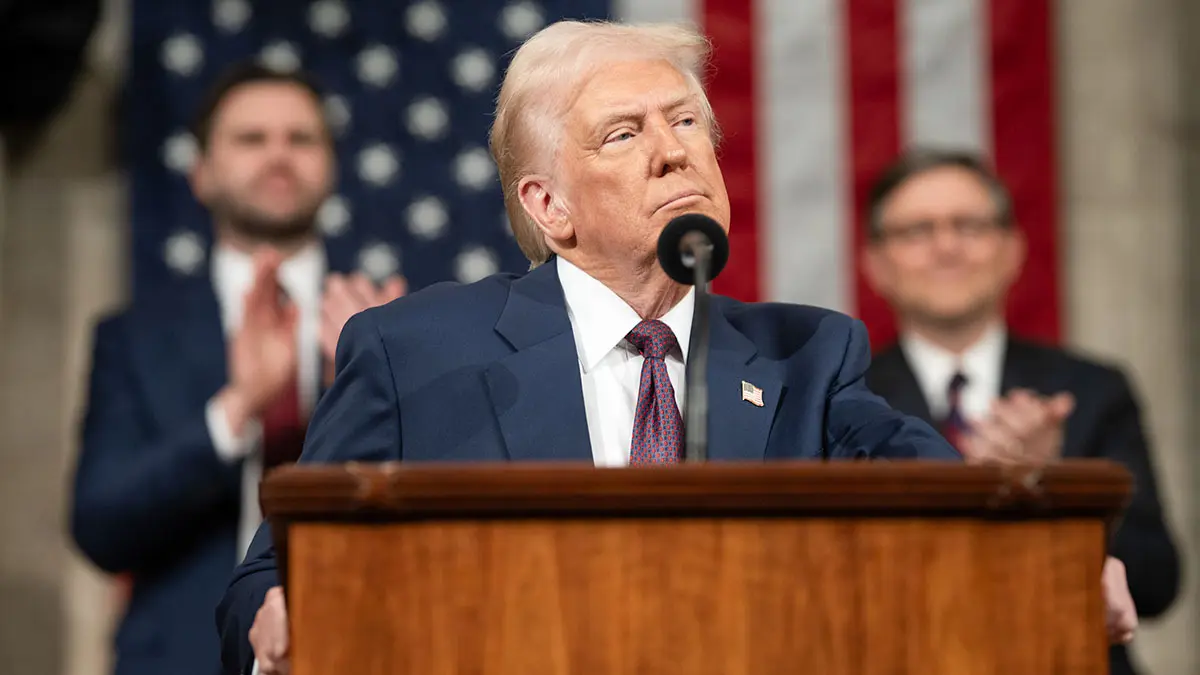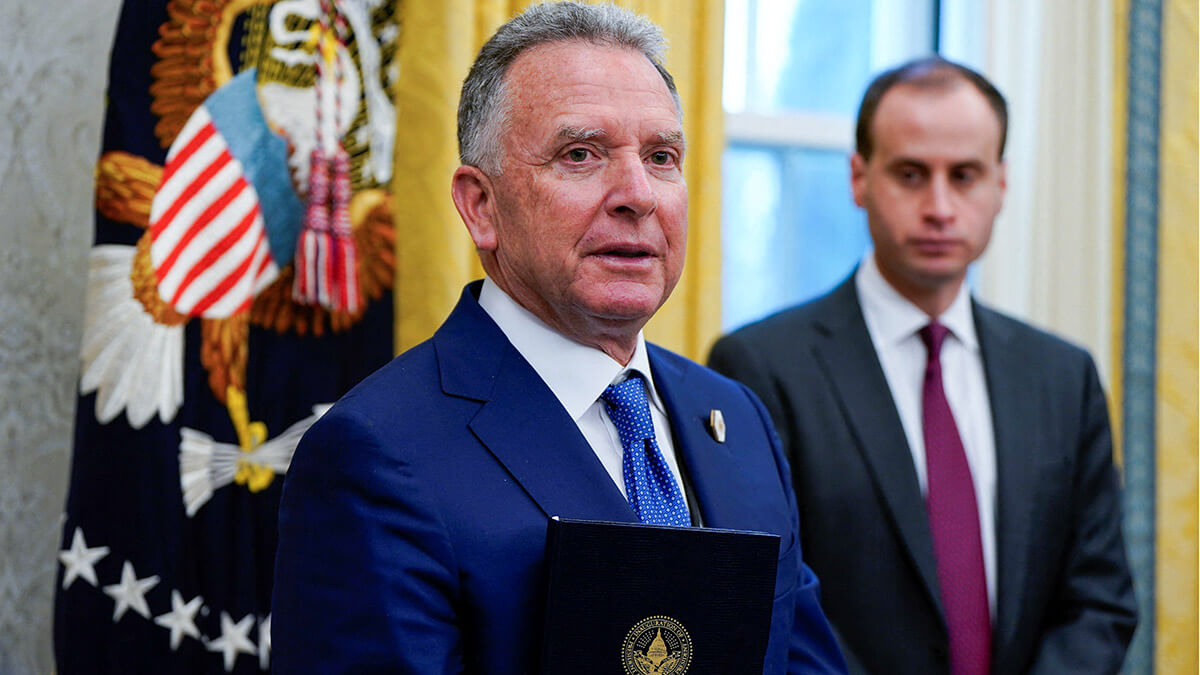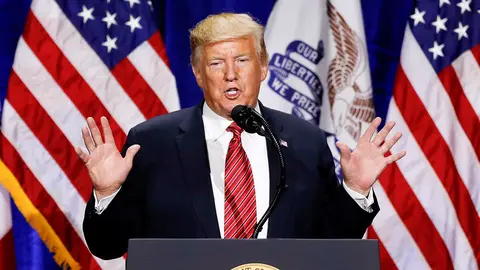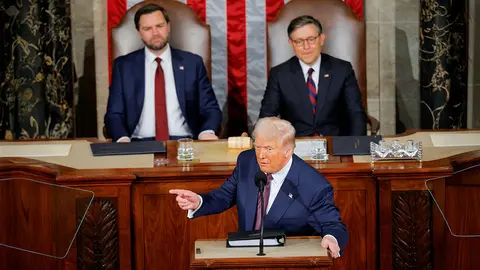Trump begins his visit to the Gulf in search of major economic agreements

- Tensions with Israel over the diplomatic agenda
- Qatar and the Emirates: more agreements, less politics
- Gaza and the Abraham Accords on hold
- A clear commitment to the economy
US President Donald Trump began a four-day tour of the Persian Gulf on Tuesday, landing in Riyadh with the aim of securing major economic deals with regional powers such as Saudi Arabia, Qatar and the United Arab Emirates. Accompanied by a delegation of senior officials and business leaders, Trump was welcomed with honours by Saudi Crown Prince Mohammed bin Salman, with whom he held an initial meeting focused on trade, energy and regional security.
We are thrilled to welcome President Trump @POTUS to Riyadh for a visit that marks another milestone in our strategic partnership.
— Reema Bandar Al-Saud (@rbalsaud) May 13, 2025
Together, the Kingdom of Saudi Arabia and the United States of America stand as a force for good, advancing peace, security, and prosperity across… https://t.co/FT8KwbI4jh
The meeting took place amid a tense geopolitical context: the war in Gaza continues, the Iranian nuclear programme continues to cause concern in Washington and Jerusalem, and negotiations between Russia and Ukraine are at a standstill.
#فيديو | فخامة رئيس الولايات المتحدة الأمريكية يصل المملكة في زيارة دولة، وسمو #ولي_العهد في مقدمة مستقبليه.#الرئيس_الأمريكي_في_المملكة#TrumpInKSA#Video | His Excellency the President of the United States of America arrives in the Kingdom on a state visit, and His Highness… pic.twitter.com/UpOKnNKMpR
— محمد بن سلمان بن عبد العزيز (Informal) (@HRHMBNSALMAAN) May 13, 2025
However, the Trump administration has made it clear that the main focus of the trip is economic. ‘His regional agenda is business, business and business,’ an Arab official with direct knowledge of the trip's planning told Axios.
Trump is seeking to secure investments worth up to 1 trillion dollars, surpassing the 600 billion dollars already committed by Riyadh in January. Sources close to the president said that an ambitious arms package worth more than 100 billion dollars is also being negotiated, which would include advanced military technology and C-130 aircraft.
Tensions with Israel over the diplomatic agenda
Israel's exclusion from the president's itinerary has caused discomfort in Jerusalem. The decision seems to reflect a clear priority for economics over traditional diplomacy.
Mistrust increased after Trump's recent decision to pause attacks on the Houthis in Yemen, a decision that did not include guarantees for Israel despite the rebel group's continued attacks.
At the same time, the start of discreet negotiations with Iran in Oman has been poorly received by Benjamin Netanyahu's government, which fears that any agreement will be insufficient to curb Iran's nuclear programme. Trump, however, has left the door open to military action if diplomacy fails to bear fruit.
Furthermore, Trump's visit to the region comes one day after the release of Idan Alexander, an Israeli-American hostage who had been held for more than 19 months by Hamas in the Gaza Strip. The release was described as a gesture of goodwill towards the Trump administration, according to diplomatic sources.
I was honored to meet Edan Alexander today and welcome him home. After months in captivity, the world is inspired by his courage and resilience. His return gives hope to so many. We also had the opportunity to speak with @POTUS, whose leadership made this possible. We remain… pic.twitter.com/9rninnXSJy
— Office of the Special Envoy to the Middle East (@SE_MiddleEast) May 13, 2025
Qatar and the Emirates: more agreements, less politics
On Wednesday, Trump will travel to Doha, where he will meet with Emir Tamim bin Hamad al-Thani. The Qatari royal family is expected to present the president with a customised Boeing 747-8 aircraft, possibly intended for his future presidential library. On Thursday, the president will visit Abu Dhabi to continue trade and strategic talks, particularly in the artificial intelligence and renewable energy sectors.
According to Bloomberg sources, the US government is seeking to establish a joint technology innovation fund with the United Arab Emirates with an initial endowment of 200 billion dollars.
President Trump arrives in Riyadh, Saudi Arabia, and is greeted by Crown Prince Mohammed bin Salman. 🇺🇸🇸🇦 pic.twitter.com/4XeT1XXgT2
— The White House (@WhiteHouse) May 13, 2025
Gaza and the Abraham Accords on hold
Although the Abraham Accords — promoted by Trump during his first term — remain a priority of his foreign policy, diplomatic sources acknowledge that progress in normalising relations between Saudi Arabia and Israel is unlikely as long as the war in Gaza continues and Netanyahu rejects a permanent ceasefire.
‘The timing is not right,’ admitted Steve Witkoff, Trump's special envoy for the Middle East. However, he hinted that the administration has not ruled out reviving those talks if conditions are right in the coming months.

A clear commitment to the economy
On his second trip abroad since returning to the presidency — the first was to Rome for Pope Francis' funeral — Trump seems determined to make the Gulf region a pillar of his global economic strategy. Under the slogan ‘peace through trade,’ his administration is seeking to consolidate strategic alliances that reinforce US dominance over China and Russia in a region that is key to energy, security and global investment.
Trump is expected to return to Washington on Friday with a series of agreements that could mark a new chapter in relations between the United States and the Arab world.










